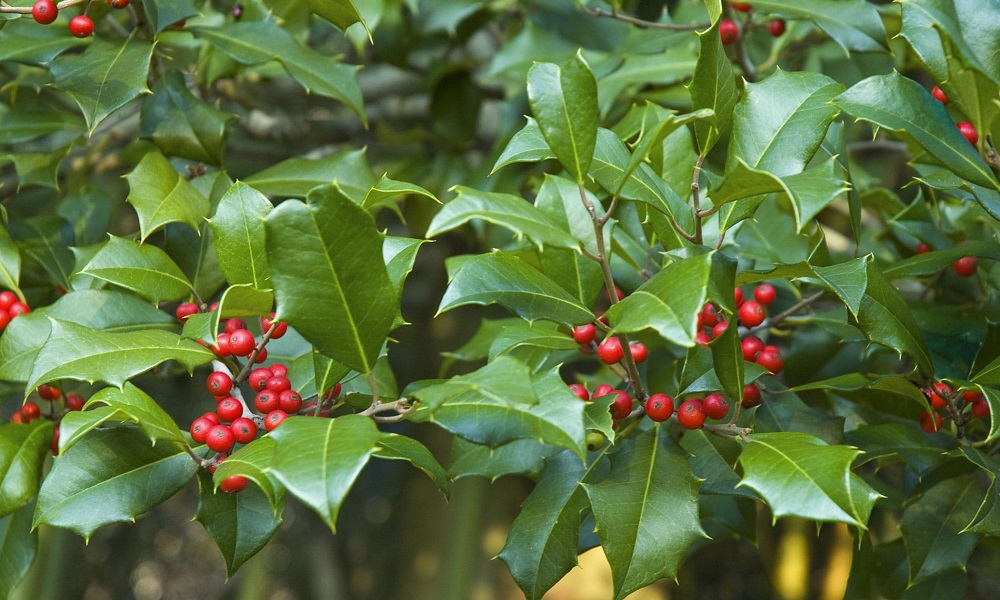Yes, holly berries are considered to be poisonous to dogs. Holly plants, including their berries, contain substances known as saponins, which can be toxic to dogs if ingested in large quantities. When dogs consume holly berries, it can lead to symptoms such as gastrointestinal upset, including vomiting and diarrhea.
In some cases, dogs may also experience excessive drooling, decreased appetite, and potentially even more severe symptoms. If you suspect that your dog has ingested holly berries or any potentially toxic substance, it is important to seek immediate veterinary attention.
The veterinarian will be able to evaluate the situation, provide appropriate treatment, and offer guidance on further steps to ensure your dog’s well-being.

What Happens If Your Dog Eats Holly Berries?
If your dog eats holly berries, they may experience gastrointestinal upset including vomiting and diarrhea. In severe cases, holly berry toxicity can lead to liver failure.
Here’s what can happen if a dog consumes holly berries:
Drooling and mouth irritation: Ingesting holly berries can cause excessive drooling in dogs. The saponins present in the berries may also irritate the mouth and throat, leading to discomfort.
Gastrointestinal upset: Holly berries contain compounds called saponins, which can irritate the digestive system. As a result, dogs may experience symptoms such as vomiting, diarrhea, and abdominal pain.
Dehydration: Vomiting and diarrhea resulting from holly berry ingestion can lead to fluid loss and dehydration if not addressed promptly. It is essential to monitor your dog’s hydration levels and seek veterinary attention if necessary.
Decreased appetite: Dogs who have consumed holly berries might exhibit a decreased appetite due to gastrointestinal upset and discomfort caused by the toxins.
Other potential symptoms: In severe cases or if large amounts of holly berries are ingested, additional symptoms may occur. These can include lethargy, weakness, tremors, difficulty breathing, and even seizures. However, such severe symptoms are less common.
What Happens If a Dog Eats a Holly Leaf?
If a dog eats a holly leaf, the first thing that will happen is that they will start to drool excessively. This is because the holly leaf contains saponin, which is a natural detergent.
The next thing that will happen is that the dog will start to vomit. This is because the holly leaf also contains tannins, which are astringent and can cause irritation in the stomach.
In severe cases, the dog may also experience diarrhea.
How Many Holly Berries Are Poisonous?
Holly berries are generally considered to be poisonous to humans, though there is some debate on the subject.
The majority of sources seem to agree that all holly berries are at least mildly toxic, and eating a large number of them can cause gastrointestinal distress and vomiting.
Some sources also suggest that holly berries can be fatal if ingested in large quantities, though there is no concrete evidence to support this claim.
Holly berries are thought to be more toxic to children than adults, so it is important to keep them out of reach if you have small kids in your home.
If someone ingests holly berries and begins experiencing symptoms, it is important to seek medical attention immediately.
Can Dogs Chew Holly?
Holly is not toxic to dogs, however it can be a choking hazard. If you have holly in your home and are concerned about your dog getting ahold of it, consider hanging the plants out of reach or placing them in a room that your dog does not have access to.
What to Do If Your Dog Eats Holly Berries?
If your dog eats holly berries, it’s important to take prompt action to ensure their safety. Holly berries are mildly toxic to dogs and can cause gastrointestinal upset. Here’s what you should do:
Stay calm: It’s natural to feel worried, but it’s important to stay calm and focused.
Remove the source: If you can, try to prevent your dog from eating any more holly berries. Remove any remaining berries from their reach to avoid further ingestion.
Follow professional advice: Your veterinarian may instruct you to induce vomiting in your dog or take other appropriate steps depending on the situation. It’s important to follow their advice precisely, as inducing vomiting may not be suitable in every case.
Assess the situation: Take note of the quantity of berries your dog consumed and observe their behavior. Look for any signs of distress or discomfort.
Seek veterinary attention: If your veterinarian advises it or if your dog exhibits severe symptoms, they may recommend bringing your dog in for an examination. They can provide appropriate treatment and monitor your dog’s condition closely.
Provide supportive care: While awaiting professional advice, you can keep an eye on your dog and offer supportive care. Ensure they have access to fresh water, and monitor them closely for any changes in behavior, appetite, or signs of distress.
Remember, it’s always better to err on the side of caution when it comes to your pet’s health. Professional guidance from a veterinarian is crucial to ensure the well-being of your dog when they consume potentially toxic substances like holly berries.
Are Holly Berries Poisonous to Toddlers?
It turns out that holly berries are poisonous to toddlers (and adults!) If ingested, they can cause vomiting, diarrhea, and abdominal pain. In severe cases, holly berry poisoning can lead to liver failure and death.
So it’s best to keep these berries away from little ones. If you think your toddler has eaten a holly berry, call poison control immediately. With prompt medical treatment, most cases of holly berry poisoning are not fatal.
Conclusion
The short answer to this question is yes, holly berries are poisonous to dogs. They can cause gastrointestinal upset if consumed in large quantities, so it’s best to keep your dog away from them.
If you think your dog has eaten a holly berry, watch for signs of vomiting or diarrhea and contact your veterinarian if they occur.